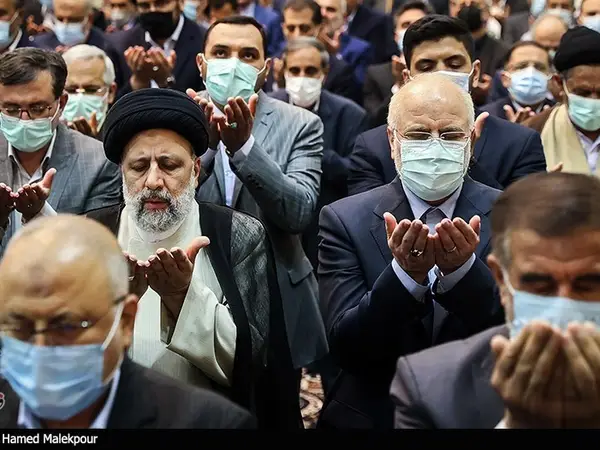Both ‘reformist’ and conservative press in Tehran continue to criticize the Raisi administration's inability to control inflation and improve the economy.
They point out that the hardliner president cannot have any political excuses because all power is concentrated in the hands of Iran’s conservative, loyalist camp.
In an article in the reformist daily Etemad, economic columnist Albert Boghossian reminded readers that during the presidential election campaign in 2017 when Ebrahim Raisi and Hassan Rouhani were the leading candidates, Raisi suggested a debate with Rouhani "to put an end to blaming previous governments for current problems."
Apparently, Raisi wanted to defend the performance of ultraconservative President Mahmoud Ahmadinejad who had preceded Rouhani and stop the incumbent president from blaming Ahmadinejad for the shortcomings during his first term of office (2013-2017).
However, the Boghossian observed that Raisi is still blaming his predecessor for the ongoing economic problems of Iran. He pointed out that this is because Iran lacks a growth model and a sustainable development plan. With such a plan, the coming and going of various governments will not dramatically affect the country's growth and successive governments will not behave diagonally different from each other.
The article argued that the Raisi administration still has not offered a strategic plan, nine months after taking office.
The price of one kilogram of rice which was 300,000 ($1.20) rials at the beginning of Raisi's term of office is now 1,100,000 rials ($4.40). Likewise, the price of one kilogram of meat has risen from 1,300,000 rials to 2 million rials ($8). The cheapest Iranian-made car, Pride, which is an unsafe 1990s compact model, was sold for 1,400,000,000 rials when Raisi took office in August 2021. Its price is over 2,100,000,000 rials ($8,400) now.
Thus, this trend shows that not only Raisi has not been able to harness rising inflation, but its inability to offer a development plan has further worsened the economic situation, Boghossian argued.
However, the article, like many others, made no mention of the diplomatic deadlock in resolving Iran’s nuclear and other disputes with the United States and the serious impact American sanctions have on the worsening economic crisis.
Meanwhile, conservative daily Jomhuri Eslami on Sunday carried a commentary by Gholamreza Bani Asadi, who criticized Raisi for failing to follow the teachings of Shite imams in running the affairs of the state.
"How can those who constantly create problems for the people and instil anxiety in their everyday life prove that they are the followers of Imam Ali, the first imam of the Shiites sect?" asked Bani Asadi without naming Raisi. The writer then accused today's officials of boasting about their plans before their election and blaming previous governments for problems in the people's livelihood.
He wrote: "Of course the previous governments are partly responsible for the problems, but all the roads have been left open for you to tackle the problems. What happened to all those claims about defeating the world powers?"
He added: "You are still instilling anxiety among the people and the workforce even worse than the previous government. Was this how you wanted to amaze the whole world with your performance?"
The writer added that the outcome of the government's inability to solve the country's economic problems can be seen on social media where one can witness how Iranian's belief in God has weakened. "And while the people are looking for transparency and honesty, you are simply trying to restrict their access to social media," the Jomhouri Eslami observed.
